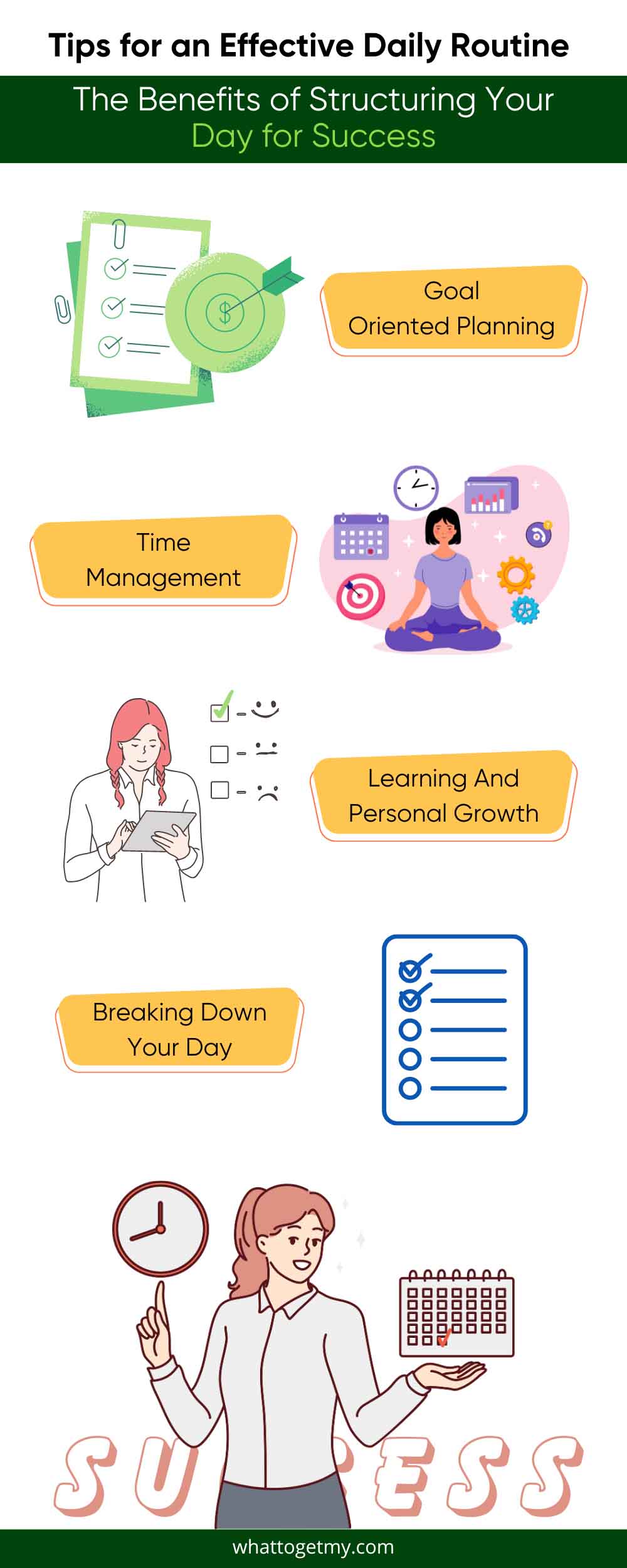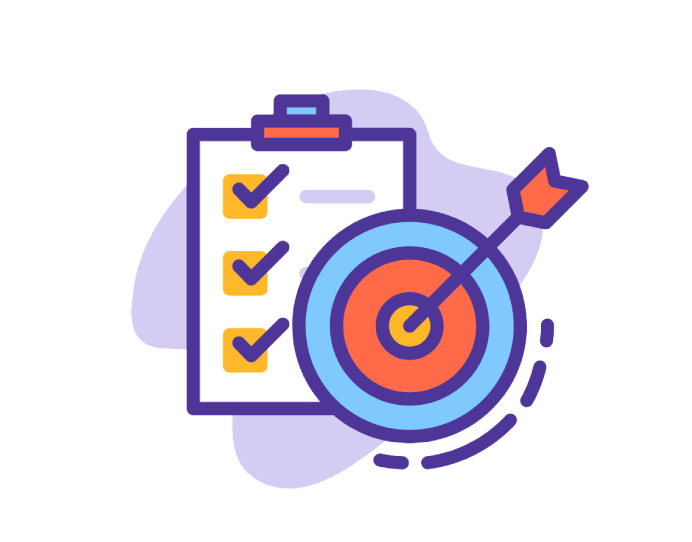9 Tips for an Effective Daily Routine: The Benefits of Structuring Your Day for Success in 2023
Table of Contents
Do you feel like you’re going through the motions? Or you’re not living your life to the fullest?
An effective daily routine is a consciously designed plan that outlines how you structure your day to optimize productivity, achieve goals, and experience a sense of fulfillment.
While the structure is crucial, it is equally important to maintain balance and flexibility within your daily routine.
Once you clearly understand your goals and priorities, it’s time to divide your day into manageable blocks of time for different activities.
Amidst the busyness of daily life, it’s crucial to allocate dedicated time for essential activities that contribute to your overall well-being and success.
A. Introduction to the Importance of an Effective Daily Routine
Do you feel like you’re going through the motions? Or you’re not living your life to the fullest? If you’re not living your life to the fullest, you’re not alone. Creating an effective daily routine can help us structure our day for success. Imagine starting each day with a clear plan, knowing exactly what needs to be done and when. Picture yourself effortlessly tackling tasks, feeling accomplished, and progressing toward your aspirations. This is the power of an effective daily routine—a structured approach to managing our time and energy that sets the stage for success in various aspects of our lives.
B. The Benefits of a Structured Daily Routine
A structured daily routine offers numerous benefits beyond mere time management. It gives us control and predictability, reducing stress and anxiety from chaotic or disorganized days. With a well-designed routine, we can prioritize tasks effectively, ensuring that essential activities receive the attention they deserve.
Furthermore, an effective daily routine enhances productivity by optimizing our mental and physical resources. It helps us allocate time for crucial activities such as self-care, exercise, learning, and personal growth. By incorporating these elements into our routine, we can maintain a healthy work-life balance and prevent burnout.
C. This Article will Provide a Comprehensive Guide on Effective Daily Routines and How to Structure Your Day for Success
This comprehensive guide will delve into the art of creating an effective daily routine. We will explore the key components that make a routine successful, understand how to design and adapt it to meet our individual needs and discover strategies to maximize productivity throughout the day.
Whether you’re a student striving for academic excellence, a professional aiming for career advancement, or someone seeking personal development and fulfillment, this article will equip you with the knowledge and tools to structure your day for success. By implementing the insights and techniques shared here, you can unlock your full potential, make the most of your time, and embark on a path toward achieving your goals.
Now, let’s embark on a journey to discover the power of an effective daily routine and how it can transform your life.
II. Understanding the Elements of an Effective Daily Routine
A. Defining an Effective Daily Routine and Its Significance for Success
An effective daily routine is a consciously designed plan that outlines how you structure your day to optimize productivity, achieve goals, and experience a sense of fulfillment. It goes beyond a mere schedule and involves intentionally allocating time and energy to various activities that contribute to your overall success.
The significance of an effective daily routine for success lies in its ability to provide structure and direction to your life. It serves as a roadmap that guides your actions, allowing you to maximize your time and resources. By implementing a routine, you create a consistent framework that supports your aspirations and keeps you focused on the tasks that truly matter.
B. Explaining the Key Components of a Successful Daily Routine
1. Goal-oriented Planning: An effective daily routine begins with identifying your goals and priorities. It involves setting clear objectives and breaking them into actionable tasks that can be accomplished within a day. By aligning your routine with your goals, you ensure that your efforts are directed toward meaningful progress.
2. Time Management: Efficient time management is crucial to a structured daily routine. It involves allocating specific time blocks for different activities: work, study, exercise, relaxation, or personal pursuits. Prioritizing tasks and managing your time effectively allows you to avoid procrastination, eliminate distractions, and make the most of your productive hours.

3. Self-care and Well-being: A well-rounded routine recognizes self- care’s importance and prioritizes physical and mental well-being. It includes exercise, meditation, adequate rest, and healthy eating habits. Taking care of yourself ensures you have the energy and resilience to tackle daily challenges and maintain a balanced lifestyle.
4. Learning and Personal Growth: Incorporating opportunities for learning and personal growth within your routine is vital for long-term success. This can involve reading, skill development, reflection, or pursuing hobbies and interests. Continual learning helps expand your knowledge, broaden your perspectives, and develop new skills contributing to personal and professional growth.
C. Highlighting the Importance of Balance and Flexibility in Structuring Your Day for Success
While the structure is crucial, it is equally important to maintain balance and flexibility within your daily routine. Striking a balance involves allocating time to different aspects of your life, including work, relationships, self-care, and recreation. It ensures you pay attention to essential areas while focusing on specific goals.
Flexibility is vital because life is unpredictable, and unexpected events or changing priorities may arise. Building flexibility into your routine allows you to adapt and adjust when necessary without feeling overwhelmed or discouraged. It also helps manage stress and prevent burnout, enabling you to make room for spontaneity and relaxation.
By finding the right balance between structure and flexibility, you create a productive daily routine that is sustainable and adaptable. It empowers you to focus on your goals while accommodating life’s dynamic nature. Everyone’s ideal routine will differ, so it’s crucial to design one that aligns with your unique needs, preferences, and circumstances.
In the following sections, we will explore practical strategies and techniques for creating and optimizing your daily routine, ensuring that it becomes a powerful tool for your success and well-being.
III. Creating a Framework for Your Daily Routine
A. Assessing Your Goals and Priorities to Shape Your Daily Routine
Assessing your goals and priorities is essential to create an effective daily routine. Take the time to reflect on what matters most to you in various areas of your life, such as career, relationships, health, personal growth, and leisure. Consider both short-term and long-term objectives. This self-reflection will help you align your routine with what you want to achieve. By implementing key strategies and mindful practices, you can take significant steps towards optimizing your day for success and achieving your desired goals.
Identify the key activities that will contribute to your goals and prioritize them within your daily routine. Be specific and realistic about what you can accomplish in a day. Setting achievable goals will provide a sense of accomplishment and motivate you to progress.
B. Breaking Down Your Day into Manageable Blocks of Time for Different Activities
Once you clearly understand your goals and priorities, it’s time to divide your day into manageable blocks of time for different activities. Start by mapping out your typical day and identifying the available natural segments or time slots.
Consider your personal preferences and energy levels throughout the day. Determine when you are most alert and productive, and assign tasks that require concentration and focus to those periods. Allocate time for essential activities such as work or studying, meetings, meals, exercise, breaks, and personal time.
Break larger tasks or projects into smaller, actionable steps that can be accomplished within a specific time frame. This approach prevents overwhelm and allows you to progress towards your goals consistently.
C. Allocating Time for Essential Activities Such as Sleep, Exercise, and Self-Care within Your Daily Routine
Amidst the busyness of daily life, it’s crucial to allocate dedicated time for essential activities that contribute to your overall well-being and success. Make sleep a priority and allocate sufficient time for restful, quality sleep. A well-rested mind and body are essential for productivity and optimal functioning.
Integrate regular exercise into your morning jog, yoga, or gym workout routine. Physical activity boosts energy levels, improves focus, and promotes overall health and well-being.
Remember to allocate time for self-care activities that recharge and rejuvenate you. This can include meditation, journaling, reading, pursuing hobbies, or spending time with loved ones. Nurturing your mental and emotional well-being is vital for maintaining balance and preventing burnout.
By intentionally carving out time for these essential activities, you prioritize your overall health and ensure you have the energy and mindset to tackle other tasks effectively.
There are many daily routine tips for success, but the most important thing is finding what works for you. As you create your daily routine framework, remember that it should be flexible enough to accommodate unforeseen events or changing circumstances. Strive for a balance that allows you to meet your goals while caring for your well-being. In the following sections, we will explore specific strategies to optimize your morning routine, maximize productivity throughout the day, and cultivate a mindset for success within the framework of your daily routine.
IV. Designing Your Ideal Morning Routine
A. The Power of a Productive Morning Routine in Setting the Tone for the Day
How you start your morning sets the tone for the rest of the day. The importance of a structured routine cannot be overstated. It can help you stay on track, reach your goals, and reduce stress. A productive morning routine can provide a solid foundation for a successful and fulfilling day. It helps you cultivate a positive mindset, boost your energy levels, and establish control over your time.
By engaging in intentional and purposeful activities early in the day, you can set yourself up for increased productivity, focus, and overall well-being. A well-designed morning routine allows you to proactively shape your day rather than simply reacting to external circumstances.
B. Incorporating Healthy Habits and Rituals into Your Mornings to Boost Productivity
Creating an effective daily schedule is essential for anyone who wants to be productive and organized. One of the critical aspects of an effective morning routine is the inclusion of healthy habits and rituals that contribute to your overall well-being and productivity. These habits can profoundly impact your mental, emotional, and physical state, providing a solid foundation for a successful day.
Consider incorporating the following habits into your morning routine:
1. Wake Up Early: Set your alarm clock to wake up early, allowing yourself ample time to ease into the day without rushing. Waking up early provides a quiet and peaceful atmosphere that promotes focus and reflection.
2. Hydrate: Start your day by drinking a glass of water to hydrate your body after hours of sleep. Staying hydrated is essential for optimal brain function and overall well-being.
3. Movement and Exercise: Engage in physical activity to awaken your body and increase blood flow. This can be as simple as stretching, walking, or working out. Exercise boosts energy levels, improves mood, and enhances cognitive function.
4. Mindfulness and Meditation: Dedicate a few minutes to mindfulness or meditation practices to center yourself and cultivate a calm and focused mindset. These practices promote clarity, reduce stress, and enhance overall well-being.
5. Nourishing Breakfast: Fuel your body with a nutritious breakfast that provides sustained energy throughout the morning. Incorporate foods rich in protein, fiber, and vitamins to support your physical and mental performance.
C. Suggested Activities for an Effective Morning Routine That Contributes to Success
Here are some suggested activities to consider when designing your ideal morning routine:
1. Plan and Prioritize: Review your goals and tasks briefly. Plan your schedule, prioritize your tasks, and ensure alignment with your long-term goals. This helps you start the day with a clear direction and purpose.
2. Journaling or Gratitude Practice: Spend time writing in a journal to express your thoughts, feelings, or ideas. Consider incorporating a gratitude practice by reflecting on things you are grateful for. This practice cultivates a positive mindset and sets a positive tone for the day.
3. Learning and Personal Growth: Allocate time for reading, listening to educational podcasts, or engaging in activities that facilitate personal growth and learning. This allows you to expand your knowledge, gain new insights, and foster continuous self-improvement.
4. Visualization and Affirmations: Use visualization techniques to mentally rehearse your desired outcomes and visualize your goals as already achieved. Additionally, affirmations can help reinforce positive beliefs and attitudes, enhancing confidence and motivation.
5. Personal Care: Attend to your personal grooming and self-care needs. This includes activities like showering, grooming, and dressing in a way that makes you feel confident and prepared for the day ahead.
Remember, your morning routine should be tailored to your preferences and needs. Experiment with different activities and find what works best for you. Continuously assess and adjust your routine to ensure it remains effective and enjoyable.
A well-crafted morning routine sets a positive trajectory for the rest of your day. It empowers you to start each day with intention, focus, and purpose, contributing to your overall success and well-being. The following section will explore strategies for maintaining daily productivity and momentum by optimizing your workflow and managing distractions.
V. Maximizing Productivity throughout the Day
A. Strategies for Maintaining Focus and Minimizing Distractions in Your Daily Routine
Building a successful daily routine takes time and effort. Still, it’s worth it in the long run. Maintaining focus and minimizing distractions is essential for maximizing productivity throughout the day. Here are some strategies to help you stay on track:
1. Create a dedicated workspace: Designate a specific area for work or essential tasks. Ensure this space is free from distractions and has everything you need to stay focused, such as a comfortable chair, necessary tools, and minimal clutter.
2. Eliminate digital distractions: Turn off notifications on your phone or computer, or use apps that block certain websites or apps during designated work periods. This helps minimize the temptation to check social media or respond to non-essential messages constantly.
3. Practice time blocking: Divide your day into distinct time blocks dedicated to specific tasks or activities. During each block, focus solely on the designated task and avoid multitasking. This approach enhances concentration and prevents distractions from derailing your productivity.
4. Prioritize important tasks: Identify the most critical and high-impact tasks that align with your goals and tackle them when you have optimal focus and energy. Completing critical tasks early in the day reduces the risk of being overwhelmed later.

B. Effective Time Management Techniques to Make the Most of Your Day
Effective time management is crucial for maximizing productivity. Consider incorporating the following techniques into your daily routine:
1. Prioritize tasks: Identify the most critical tasks that need to be completed and prioritize them based on urgency and importance. Focus on high-priority items first to ensure they receive adequate attention.
2. Use time management techniques: Explore techniques such as the Pomodoro Technique, where you work for a set amount of time (e.g., 25 minutes) and then take a short break (e.g., 5 minutes). This structured approach can improve focus and productivity.
3. Delegate and outsource: Recognize tasks that can be delegated or outsourced to others, whether at work or in your personal life. Delegating tasks allows you to focus on more strategic or high-value activities.
4. Avoid overcommitting: Be mindful of how much you commit to in a given day or week. Only take on tasks you can realistically handle without compromising quality and causing burnout. Learn to say no when necessary to protect your time and energy.
C. Utilizing Productivity Tools and Technology to Enhance Efficiency in Your Routine
Leveraging productivity tools and technology can significantly enhance efficiency in your daily routine. Consider the following:
1. Task management apps: Use digital task management apps like Todoist, Trello, or Asana to organize and prioritize your tasks. These tools allow you to create task lists, set deadlines, and track progress.
2. Calendar apps: Utilize calendar apps like Google Calendar or Microsoft Outlook to schedule and manage your appointments, meetings, and important deadlines. Set reminders to ensure you stay on top of your commitments.
3. Note-taking apps: Use Evernote or Microsoft OneNote to capture and organize ideas, meeting notes, and essential information. These apps allow you to access your notes across devices and stay organized.
4. Automation tools: Explore automation tools like IFTTT or Zapier to streamline repetitive tasks and save time. These tools can help automate data entry, file organization, email filtering, and other routine processes.
Remember, while technology can be helpful, it’s essential to strike a balance and not let it become a source of distraction itself. Use productivity tools judiciously and adapt them to suit your needs and preferences.
By implementing these strategies, managing your time effectively, and leveraging productivity tools, you can enhance efficiency, minimize distractions, and make the most of your day. The following section will explore the importance of cultivating a success mindset and incorporating self-reflection into your daily routine.
VI. The Power of Mindfulness and Mindset in Your Daily Routine
A. Exploring the Connection Between Mindfulness, Mindset, and Daily Success
The power of mindfulness and mindset in your daily routine goes beyond mere productivity. They profoundly impact your overall well-being, happiness, and success. Mindfulness is the practice of being fully present and aware of the present moment, while mindset refers to the attitudes, beliefs, and perspectives that shape your thoughts and actions.
By cultivating mindfulness and adopting a positive and growth-oriented mindset, you can enhance your daily experiences and pave the way for tremendous success. These practices help you manage stress, increase focus and clarity, improve decision-making, and foster resilience in facing challenges.
B. Integrating Mindfulness Practices into Your Routine for Improved Focus and Mental Well-being
Incorporating mindfulness practices into your daily routine can significantly enhance your focus, mental well-being, and overall productivity. Here are some practices you can consider:
1. Mindful Breathing: Focus on your breath for a few moments throughout the day. Notice the sensation of each inhale and exhale, allowing yourself to become fully present at the moment. This simple practice helps ground you, reduce stress, and increase mental clarity.
2. Mindful Eating: Practice mindful eating by savoring each bite and paying attention to the food’s flavors, textures, and sensations. Engage all your senses and eat slowly, fully experiencing the nourishment and enjoyment that food provides.
3. Mindful Pause: Incorporate short mindful pauses into your routine. Pause for a few moments to check in with yourself, observe your thoughts and emotions without judgment, and recenter your focus. This practice helps you stay present and respond to situations with greater clarity and intention.
4. Gratitude Practice: Cultivate gratitude by reflecting on and expressing appreciation for the positive aspects of your life. Incorporate a gratitude journal or make it a habit to acknowledge things you are grateful for mentally. This practice shifts your focus towards the positive and promotes a more optimistic outlook.
C. Cultivating a Positive and Growth-Oriented Mindset Through Daily Habits and Mindset Exercises
Your mindset is pivotal in determining your attitude, beliefs, and actions throughout the day. Cultivating a positive and growth-oriented mindset can fuel your motivation, resilience, and willingness to embrace challenges. Here are some habits and exercises to cultivate a positive mindset:
1. Affirmations: Use positive affirmations to reinforce empowering beliefs and attitudes. Repeat affirmations that align with your goals, values, and desired outcomes. This practice helps reprogram your subconscious mind and shift negative self-talk to positive and supportive thoughts.
2. Visualizations: Engage in visualization exercises where you vividly imagine yourself achieving your goals and living your desired outcomes. Visualize the steps you need to take and the success you will attain. This practice enhances your focus, motivation, and belief in your capabilities.
3. Reflective Journaling: Dedicate time to journaling, allowing yourself to explore your thoughts, emotions, and experiences. Reflect on challenges, lessons learned, and moments of growth. This practice promotes self-awareness, self-reflection, and personal growth.
4. Surrounding Yourself with Positivity: Surround yourself with positive influences, whether supportive friends, inspiring books, or motivational podcasts. Seek resources and communities that uplift and encourage you to maintain a positive mindset.
By incorporating mindfulness practices and cultivating a positive and growth-oriented mindset, you create a robust foundation for success in your daily routine. These practices help you navigate challenges, maintain focus, and approach each day with resilience and optimism. In the next section, we will explore strategies for managing distractions and optimizing your environment to enhance your daily routine for success further.
VII. Maintaining Consistency and Adapting Your Routine
A. The Importance of Consistency in Sticking to Your Daily Routine for Long-Term Success
Consistency is crucial in reaping the long-term benefits of an effective daily routine. Habits are formed through consistent practice, and sustained effort leads to meaningful results. Consistency provides stability, predictability, and a sense of rhythm to your daily life.
When you adhere to your routine consistently, you create a reliable structure that supports your goals and aspirations. It allows you to build momentum, progress, and develop a sense of discipline. Consistency also helps you establish a positive feedback loop, where the rewards of your routine reinforce your motivation to continue.
According to this data from Statista, the global market for task management software witnessed substantial revenue generation in 2018, with projections indicating significant growth in the years ahead. The market is anticipated to expand at a compound annual growth rate of 13.7 percent, culminating in an estimated annual revenue of 4.33 billion U.S. dollars by 2023.

B. Strategies for Adapting Your Routine to Accommodate Changing Circumstances and Challenges
While consistency is important, it’s equally crucial to recognize that life is dynamic and circumstances change. Adapting your routine to accommodate these changes is essential for maintaining its effectiveness. Here are some strategies to help you adapt your routine:
1. Assess and Prioritize: Regularly assess your goals, priorities, and commitments. Determine if any adjustments need to be made to your routine to align with your current circumstances. Prioritize the most essential activities and make room for them within your revised routine.
2. Flexibility and Openness: Embrace flexibility in your routine. Be open to adjusting activities’ timing, duration, or order based on the day’s demands. This flexibility allows you to navigate unexpected events or new opportunities without feeling overwhelmed or rigidly tied to a fixed schedule.
3. Batch and Delegate: Look for opportunities to batch similar tasks together and delegate responsibilities when possible. This allows you to optimize your time and energy while maintaining efficiency in your routine. By delegating tasks to others, you free up time to focus on higher-priority activities.
4. Time Blocking: Use time-blocking techniques to allocate dedicated time slots for specific activities. This approach helps ensure that essential tasks are given the necessary attention and prevents them from being neglected amidst other distractions or competing priorities.
C. Overcoming Obstacles and Staying Motivated on Your Journey to Maintaining an Effective Daily Routine
You may encounter obstacles and challenges as you strive to maintain an effective daily routine. It’s crucial to develop strategies to overcome these obstacles and stay motivated. Here are some tips to help you on your journey:
1. Anticipate and Plan for Challenges: Identify potential obstacles that may disrupt your routine and develop contingency plans to overcome them. This proactive approach allows you to stay prepared and minimize the impact of unexpected events.
2. Seek Support and Accountability: Surround yourself with a supportive network of friends, family, or like-minded individuals who can provide encouragement, guidance, and accountability. Share your goals and progress with them, and lean on their support during challenging times.
3. Celebrate Milestones and Progress: Acknowledge and celebrate your milestones and achievements. Recognize your progress and the positive changes you’ve experienced due to your routine. This celebration reinforces your motivation and sense of accomplishment.
4. Reflect and Adjust: Regularly assess your routine’s effectiveness. Be open to making adjustments and improvements based on your experiences and feedback. Continuously refine and optimize your routine to align with your goals and evolving circumstances.
By maintaining consistency, adapting to changes, and overcoming obstacles, you can sustain the effectiveness of your daily routine in the long run. Stay committed to the process, remain flexible when needed, and keep your eyes on the ultimate vision of success. In the final section, we will conclude the article by emphasizing the importance of self-care and balance within your daily routine for sustainable success and well-being.
VIII. Enhancing Your Daily Routine with Healthy Habits
A. The Role of Nutrition and Hydration in Supporting a Productive Daily Routine
Nutrition and hydration are vital to a productive daily routine. Proper nourishment provides the energy and nutrients needed for optimal cognitive function, focus, and overall well-being. Here are some tips to enhance your routine with healthy eating habits:
1. Balanced Meals: Ensure your meals balance macronutrients (carbohydrates, proteins, and fats) and micronutrients (vitamins and minerals). Incorporate whole grains, lean proteins, healthy fats, and various fruits and vegetables into your diet.
2. Regular Meal Times: Establish regular meal times and avoid skipping meals. This helps maintain stable energy levels throughout the day and prevents unhealthy snacking or overeating due to hunger.
3. Hydration: Drink adequate water throughout the day to stay hydrated. Dehydration can lead to fatigue, decreased cognitive function, and reduced productivity. Keep a water bottle handy, and make it a habit to sip water regularly.
B. Incorporating Regular Exercise and Movement to Enhance Physical and Mental Well-being
Regular exercise and movement are essential for enhancing physical and mental well-being and supporting a productive daily routine. Here are some ways to incorporate exercise into your routine:
1. Find Activities You Enjoy: Choose physical activities that you enjoy and that align with your fitness goals. It could be walking, jogging, cycling, dancing, or practicing yoga. When you enjoy the activity, you’re more likely to stick with it.
2. Schedule Exercise Breaks: Allocate dedicated time for exercise breaks within your daily routine. These breaks can be short bursts of physical activity or longer workout sessions, depending on your preference and schedule. Aim for at least 30 minutes of moderate-intensity exercise most days of the week.
3. Movement Throughout the Day: Look for opportunities to incorporate movement into your daily activities. Take the stairs instead of the elevator, go for short walks during breaks, or stand up and stretch periodically if you have a sedentary job. These small movements add up and contribute to your overall well-being.
C. Practicing Self-Care and Stress Management Techniques for Optimal Performance within Your Routine
Self-care and stress management techniques are crucial for optimal performance within your daily routine. They help you maintain balance, reduce stress, and enhance your well-being. Consider these practices:
1. Prioritize Rest and Sleep: Ensure you get enough sleep each night to support your physical and mental health. Establish a consistent sleep schedule and create a relaxing bedtime routine to promote restful sleep.
2. Mindfulness and Relaxation Techniques: Incorporate mindfulness and relaxation practices into your routine, such as deep breathing exercises, meditation, or progressive muscle relaxation. These techniques help reduce stress, enhance focus, and promote mental clarity.
3. Set Boundaries and Take Breaks: Establish boundaries to protect your time and energy. Take regular breaks throughout the day to recharge and rejuvenate. Engage in activities that bring you joy and help you relax, such as reading, listening to music, or spending time in nature.
4. Social Connections: Nurture your relationships and maintain social connections. Spend time with loved ones, engage in meaningful conversations, or join social groups that align with your interests. Positive social interactions contribute to your overall well-being and help you manage stress.
Incorporating healthy eating habits, regular exercise, and self-care practices into your daily routine enhances your physical and mental well-being, setting the stage for sustained success. In the final section, we will conclude the article by emphasizing the importance of reflection and continuous improvement in optimizing your daily routine for long-term success.
IX. Tracking Progress and Making Adjustments
A. The Value of Tracking Your Daily Routine and Progress Towards Your Goals
Tracking your daily routine and progress towards your goals is a valuable practice that allows you to assess your performance, identify patterns, and make informed adjustments. Here are some crucial reasons for tracking:
1. Accountability: Tracking holds you accountable for your actions and commitments. It provides a clear picture of how you spend your time and whether it aligns with your goals and priorities.
2. Awareness: By tracking your routine, you become more aware of your habits, strengths, and areas for improvement. This awareness empowers you to make conscious choices and optimize your daily activities.
3. Motivation and Momentum: Tracking your progress can boost your motivation and help you stay on track. Seeing tangible evidence of your accomplishments and progress reinforces your dedication and drives you to keep pushing forward.
B. Methods for Tracking and Analyzing Your Activities to Identify Areas for Improvement
To track and analyze your activities effectively, consider using the following methods:
1. Time Logging: Keep a detailed record of how you spend your time each day. Note each activity’s start and end times, including breaks and leisure time. This lets you see where your time is invested and identify inefficiencies or gaps.
2. Activity Journaling: Maintain an activity journal where you reflect on the quality and impact of your daily activities. Write down your thoughts, feelings, and observations about each activity. This helps you assess their value and identify patterns or trends.
3. Productivity Apps and Tools: Utilize productivity apps or tools that help you track and analyze your activities. These tools can provide visual representations of your time usage, help you set goals and milestones, and generate reports for analysis.
4. Goal Progress Monitoring: Regularly review your progress towards your goals. Measure and record critical metrics or milestones related to your goals. This allows you to track your advancement, identify areas where you fall behind, and make necessary adjustments.

C. Making Adjustments to Your Routine Based on Feedback and Results to Optimize Your Success
Tracking your routine and progress is only valuable if you use the insights gained to make informed adjustments. Here’s how you can optimize your success by making necessary changes:
1. Review and Reflect: Periodically review your tracking records and reflect on the data and insights gathered. Look for patterns, identify bottlenecks or areas of improvement, and assess whether your routine aligns with your goals.
2. Set SMART Goals: Based on your analysis, set SMART (Specific, Measurable, Achievable, Relevant, Time-bound) goals for areas you want to improve or optimize. This allows you to have clear objectives to work towards.
3. Experiment and Iterate: Implement small changes or experiments in your routine to test different approaches and determine what works best for you. Monitor the impact of these adjustments and iterate as needed to refine your routine further.
4. Seek Feedback and Support: Seek feedback from trusted individuals who can provide objective insights on your routine and progress. Consider working with a mentor, coach, or accountability partner who can provide guidance and support in making adjustments.
Remember, making adjustments to your routine is a dynamic and ongoing process. As you gain more experience and continue tracking and analyzing your progress, you’ll discover new insights and refine your routine to optimize your success.
In the concluding section, we will summarize the key points discussed throughout the article and provide a final word of encouragement to inspire readers to take action and implement an effective daily routine for their personal and professional success.
Frequently Asked Questions
Q1: Why is having an effective daily routine important?
A1: An effective daily routine provides structure, helps prioritize tasks, and optimizes productivity. It enables you to manage your time effectively, reduces stress, and improves work-life balance. A well-structured routine also helps in achieving goals and fosters personal growth.
Q2: How do I create an effective daily routine?
A2: To create an effective daily routine, assess your goals and priorities. Break down your day into manageable blocks of time, and allocate specific time for essential activities such as sleep, exercise, and self-care. Incorporate healthy habits, practice mindfulness, and ensure flexibility to adapt to changing circumstances.
Q3: What are some critical components of a successful daily routine?
A3: Key components of a successful daily routine include time management, goal setting, prioritization, incorporating healthy habits, maintaining balance, and adapting to changing needs. It should include dedicated time for essential activities, self-care, and reflection.
X. Conclusion
A. Recap of the Key Points Discussed in the Article about Effective Daily Routines
Throughout this article, we have explored the significance of effective daily routines and how they can structure your day for success. Here’s a recap of the key points we’ve covered:
– We began by understanding the elements of an effective daily routine, emphasizing the importance of balance and flexibility.
– We discussed creating a framework for your daily routine by assessing goals, breaking down your day into manageable blocks, and allocating time for essential activities such as sleep, exercise, and self-care.
– We delved into designing an ideal morning routine and explored the power of incorporating healthy habits and rituals to boost productivity.
– The role of mindfulness and mindset in your daily routine and practical strategies for integrating mindfulness practices and cultivating a positive and growth-oriented mindset were highlighted.
– We emphasized the importance of maintaining consistency and adapting your routine to accommodate changing circumstances and challenges. Strategies for overcoming obstacles and staying motivated were also provided.
– The article further explored the enhancement of daily routines with healthy habits, including the role of nutrition, hydration, regular exercise, and self-care practices.
– Tracking progress and making adjustments were discussed as vital aspects of maintaining an effective daily routine, with methods for tracking and analyzing activities provided.
B. Final Thoughts on the Importance of Structuring Your Day for Success through a Well-Designed Daily Routine
Structuring your day for success through a well-designed daily routine is a powerful way to maximize your potential and achieve your goals. By consciously organizing your time, focusing on priorities, and incorporating healthy habits, you create a solid foundation for productivity, well-being, and personal growth.
An effective daily routine allows you to harness the power of consistency, mindfulness, and self-care. It provides structure and balance while also offering the flexibility to adapt to the ever-changing demands of life. By optimizing your routine, you cultivate habits that support your mental, emotional, and physical well-being, setting the stage for long-term success and fulfillment.
C. Call-to-Action: Encouraging Readers to Implement the Strategies and Tips Provided to Create Their Effective Daily Routine for Success
Now that you have gained valuable insights and practical strategies for designing an effective daily routine, it’s time to take action. I encourage you to implement the following steps:
1. Reflect on your current routine and identify areas for improvement.
2. Define your goals and priorities.
3. Create a framework for your daily routine, allocating time for essential activities and incorporating healthy habits.
4. Embrace mindfulness and cultivate a positive mindset.
5. Maintain consistency while remaining adaptable to change.
6. Enhance your routine with healthy habits such as proper nutrition, regular exercise, and self-care practices.
7. Track your progress and make adjustments based on feedback and results.
Remember, creating an effective daily routine is a journey. It requires commitment, self-reflection, and a willingness to iterate and refine your approach. As you implement these strategies, stay focused on your goals and stay motivated. Embrace the power of routine and watch as it transforms your life, leading you to tremendous success and well-being.
Begin today, and step by step, you’ll discover the incredible impact an effective daily routine can have on your personal and professional life.
03 HOURS 46 MINUTES
ESTIMATED TIME DESIGNING AND UPLOADING THIS ARTICLE
08 HOURS 30 MINUTES
ESTIMATED TIME RESEARCHING AND WRITING THIS ARTICLE
LOOKING FOR MORE GIFTS?
Try our AMAZING GIFT FINDER TOOL! Find GIFTS with 1 CLICK!
LOOKING FOR MORE GIFTS?
Try our AMAZING GIFT FINDER TOOL! Find GIFTS with 1 CLICK!
LOOKING FOR MORE GIFTS?
Try our AMAZING GIFT FINDER TOOL! Find GIFTS with 1 CLICK!
You Might Also Like

Secret Santa Gift Ideas for Managers
Being a secret Santa is sometimes really stressful. Nobody will know what you got, that’s true, but you will! How are you supposed to live with yourself knowing that you gave a wrong gift to somebody? As if things couldn’t be any worse, you pulled

5 Perfect Gifts For Property Managers
Gifting a Property Manager is tricky because the rules of their profession and workplace practices does not allow receiving of cash gifts or extravagant gifts. The best gifts for property managers are therefore small gifts that are seen more as tokens of appreciation. Worry not,

What To Do When You Have A Bad Manager – 13 Helpful Ways
What To Do When You Have A Bad Manager WhatToGetMy Instructional Article Bad managers can make the workplace a nightmare for the employees that have to deal with their poor managerial skills. If you are on that ship and looking for practical ways to deal

11 Interesting Leadership Development Activities for Managers
Interesting Leadership Development Activities for Managers WhatToGetMy Instructional Article Leadership development activities for managers became essential for improving productivity at work. Nowadays people are working in teams and leadership skills are needed for improving the team’s performance. Many tools are used for leadership development. Coaching



